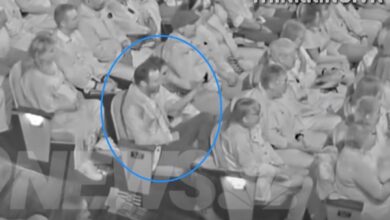Marvin Harris Gas Station Video Beating: An Analysis of Right, Wrong
In the digital age, few incidents remain hidden from the public eye, and the Marvin Harris Gas Station Video Beating is no exception. This unsettling event, captured in vivid detail, has sparked widespread debates and discussions. Join us at Thinkking.vn as we delve deep into the layers of this incident, examining the events, reactions, and the broader implications it holds for society at large.
I. The Incident: Marvin Harris Video Beating

In the bustling heart of Phoenix, Arizona, the Quik-Trip gas station stands as a testament to the daily rhythms of urban life. It’s a place where city residents pause to refuel their vehicles, grab a quick snack, or use the restroom during a busy day. However, on a day that started like any other, this ordinary gas station would become the epicenter of a controversy known as the Marvin Harris Gas Station Video Beating.
As the sun beat down on the asphalt, the gas station witnessed an influx of its regular patrons. Among them was Melvin Harris, who had probably stopped by countless times before without any incident. But this day was different. On this fateful day, the otherwise mundane act of using the restroom would lead to a sequence of events that would capture national attention.
Melvin’s teenage daughter, like many before her, entered the Quik-Trip restroom, anticipating a brief respite. But what should have been a routine experience took a sinister turn. Inside the restroom, she was confronted by an unknown man’s unsettling presence. This man, who would later be identified as Leon Armstrong, made an attempt to intrude upon her privacy. The fear and vulnerability she felt in that confined space, the unease of the situation, were palpable. Her sanctuary had been disrupted, turning a simple act into a nightmare.
Emerging from the restroom, the shaken young girl relayed her disturbing experience to her father. Melvin Harris, consumed with a mix of anger, fear, and protectiveness, sought to address the situation. It wasn’t long before he identified Leon Armstrong, the man responsible for his daughter’s distress. What followed was a confrontation that no one at the Quik-Trip would ever forget.
A bystander, sensing the gravity of the unfolding situation, began recording the interaction on their smartphone. The video captured every nuance of the heated exchange between Harris and Armstrong. Words were exchanged, tensions escalated, and the situation quickly spiraled out of control. The footage, which would later be disseminated widely under the title Marvin Harris Gas Station Video Beating, offered a raw, unfiltered glimpse into a father’s protective instincts clashing with a man whose intentions remained unclear.
As the video made its rounds on social media platforms and news outlets, the Marvin Harris Gas Station Video Beating became a topic of heated debate. Was Melvin Harris justified in his actions? What drove Leon Armstrong to approach a young girl in the restroom? The incident at Quik-Trip in Phoenix wasn’t just an altercation; it raised profound questions about safety, protection, and the lengths to which a parent might go to defend their child.
II. Who was Leon Armstrong?

Amidst the chaos and controversy surrounding the Marvin Harris Gas Station Video Beating, one figure remains at the center of the narrative, eliciting a mix of sympathy, curiosity, and speculation: Leon Armstrong. But who exactly was this man, and what led him to become embroiled in such a contentious incident?
Leon Armstrong wasn’t just the man identified in the now-infamous video; he was a son, a brother, and a member of a family that loved him. Beneath the headlines and heated debates lies the story of an individual with complexities, struggles, and a life that extended far beyond the confines of a gas station restroom.
Armstrong’s family, reeling from the tragedy and the subsequent media frenzy, sought to provide a more nuanced understanding of the man they knew and loved. Tramall, Leon’s brother, painted a picture of a person far removed from the negative portrayals in some media narratives. “He was murdered. Not by a gun, not by a knife, but by somebody’s hands. You know what I’m saying,” Tramall expressed, his voice heavy with grief and frustration, emphasizing the profound loss the family felt.
Kathilena Johnson, Leon’s aunt, offered further insights into the enigmatic figure at the heart of the incident. She shed light on a crucial aspect of Leon’s life that many were unaware of: his battle with schizophrenia. “We knew automatically that he was not going in there to do anything to those young ladies,” she stated, suggesting that Leon’s actions on that fateful day might have been a result of his medical condition rather than any malicious intent. The revelation that Armstrong was off medication at the time of the incident provided a potential explanation for his disoriented behavior at the Quik-Trip.
The family’s perspective humanized Armstrong, portraying him as a man grappling with the challenges of mental illness. Their testimonies underscored the importance of understanding and compassion, urging the public to consider the broader context before passing judgment.
In the aftermath of the Marvin Harris Gas Station Video Beating, the spotlight often remained fixed on the sensational aspects of the incident. Yet, the story of Leon Armstrong serves as a poignant reminder that behind every headline lies a human being with a history, struggles, and a family left to grapple with the consequences of a moment that changed everything.
III. The Aftermath: Marvin Harris Gas Station Video Beating
The ripple effects of the Marvin Harris Gas Station Video Beating were felt far beyond the confines of the Quik-Trip in Phoenix, Arizona. The incident, while brief, had long-lasting consequences that deeply impacted the lives of everyone involved.
Leon Armstrong bore the most immediate and tragic aftermath of the altercation. The physical confrontation left him with a severe brain injury, an affliction that quickly proved to be insurmountable. Despite medical interventions, the damage to Armstrong’s brain was extensive, leading to his tragic and untimely death. This heartbreaking outcome added another layer of complexity to the narrative, transforming the incident from a mere altercation into a matter of life and death. The gravity of Armstrong’s injuries and his subsequent passing intensified public interest and debate around the event.
At the center of this maelstrom was Melvin Harris’s daughter, a young girl who had inadvertently set the tragic events in motion by sharing her restroom encounter with her father. In the wake of the incident and its dire consequences, she grappled with a mix of emotions. She voiced her deep regrets over confiding in her father about the restroom incident, stating, “Now someone’s dead. And now everyone’s coming at me like I did something to him.” Her poignant words highlighted the immense weight of guilt and sorrow she carried, having never anticipated the deadly turn of events that her revelation would lead to.
Prior to the physical altercation with Armstrong, Melvin Harris had sought to address the situation through the proper channels. He approached the store’s security personnel, urging them to “take care of the situation” and handle the man who had unnerved his daughter. His words carried an implicit warning: if the security personnel failed to act, he would take matters into his own hands. Witnesses recounted Harris’s stern admonition to the security guard, a moment that foreshadowed the violent confrontation that would soon unfold.
The aftermath of the Marvin Harris Gas Station Video Beating was a period of intense introspection, grief, and legal proceedings. It was a time when the involved parties, and the public at large, grappled with the boundaries of self-defense, the consequences of impulsive actions, and the profound impact that a single moment can have on multiple lives. The incident served as a stark reminder of the fragility of life and the intricate web of cause and effect that binds us all.
IV. Legal Consequences: Marvin Harris Gas Station Video Beating

The Marvin Harris Gas Station Video Beating not only caused emotional turmoil and heartbreak but also led to a series of legal proceedings that further highlighted the complex nature of the incident. As the video of the altercation went viral and the extent of Leon Armstrong’s injuries became clear, the legal ramifications for Melvin Harris began to take shape.
Initially, given the severity of Armstrong’s injuries and his subsequent tragic death, Melvin Harris was slapped with a grave charge: second-degree murder. This charge indicated that while the act might not have been premeditated, it resulted in the intentional killing of another person. The weight of such an accusation carried significant penalties, and the prospect of a long prison sentence loomed over Harris.
However, as the case progressed and the details surrounding the incident were meticulously examined, there emerged an opportunity for a plea deal. Recognizing the multifaceted nature of the incident – a protective father’s reaction to a perceived threat to his daughter – the legal team presented an option for Harris to plead to a reduced charge. The charge of second-degree murder was amended to manslaughter. Manslaughter, while still a serious charge, suggests that the act was not carried out with malice aforethought but was instead a result of a momentary lapse in judgment or a reaction to provocation.
Accepting the plea deal, Melvin Harris acknowledged his role in the violent confrontation and the tragic outcome that ensued. The legal system, in turn, recognized the unique circumstances of the case – a blend of protective instincts, heightened emotions, and unforeseen consequences.
The culmination of the legal proceedings saw Melvin Harris sentenced to eight years in prison. This sentence was reflective of the gravity of Armstrong’s death but also took into account the extenuating circumstances that led to the altercation.
The legal aftermath of the Marvin Harris Gas Station Video Beating serves as a testament to the intricacies of the justice system, which seeks to balance the pursuit of justice with an understanding of human emotions and actions. The case also underscores the lasting impact that a split-second decision can have, forever altering the course of multiple lives.
Father jailed for beating a creep to death after he harassed his 16 yr old daughter in the store bathroom pic.twitter.com/YNu10WF3C0
— JCFights🔞 (@JCFights) June 15, 2023
V. Family Perspectives: Marvin Harris Gas Station Video Beating
Every incident, particularly those as charged and emotional as the Marvin Harris Gas Station Video Beating, is viewed through multiple lenses, each offering a unique perspective. Among the most poignant of these viewpoints are those of the families directly affected by the incident.
Diana Jackson, Melvin Harris’s fiancée, emerged as a strong voice in the aftermath. Standing firmly by Harris’s side, she provided an intimate window into the mindset of a protective parent caught in a harrowing situation. Jackson passionately defended Harris’s actions, underscoring his primary motive: to protect their daughter from what he perceived as a clear and present danger. I’m not mad at him. I don’t feel like he did anything wrong, Diana asserted. In her eyes, Harris was a devoted father who, when confronted with a potential threat to his child, reacted as many parents might – with a fierce protective instinct.
But Diana’s viewpoint was just one piece of a broader societal conversation. The incident ignited intense debates about the nature of parental instincts and the lengths to which a parent might go to safeguard their children. While many empathized with Harris’s protective impulse, others questioned the extremity of his response. This divergence in opinion highlighted a profound societal tension: the balance between protective instincts and the potential for overreaction.
Further fueling the debate were the perspectives of those closely tied to the incident. While Harris’s family emphasized the perceived threat posed by Armstrong, the latter’s family shed light on his mental health challenges, painting a picture of a man who might have been more lost than malicious.
The Marvin Harris Gas Station Video Beating and the ensuing discourse served as a microcosm of broader societal dilemmas. The incident prompted introspection on the nature of protection, the responsibilities of parenthood, and the potential consequences of acting on instinct. Through the voices of those intimately connected to the incident, society grappled with a fundamental question: In the face of perceived danger, how far is too far when it comes to protecting our loved ones?
Other search content: melvin harris video, melvin harris iii 2023, melvin harris phoenix, leon armstrong melvin harris, melvin harris reddit, melvin harris arizona, melvin harris’ daughter, melvin harris obituary, Who is Melvin Harris?, Who is Leon Armstrong?, melvin harris gas station video, melvin harris video, father beats man at gas station, marvin harris gas station beating, melvin harris iii, leon armstrong melvin harris, melvin harris iii 2023, melvin harris phoenix, melvin harris obituary, melvin harris gta, leon armstrong phoenix, dwight dixon, Who is Melvin Harris?, Who is Leon Armstrong?.
| “Please note that all information presented in this article has been obtained from a variety of sources, including wikipedia.org and several other newspapers. Although we have tried our best to verify all information, we cannot guarantee that everything mentioned is accurate and 100% verified. Therefore, we recommend caution when referencing this article or using it as a source in your own research or report.” |










